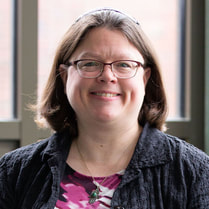Rabbi Ashira's Reflections
July - August 2024

Dear chevre,
As we enter July and look to August, many of us will be looking forward to the change of pace that summer often brings. Some people change their work schedules in the summer; others make plans to travel. Parents often begin planning for summer at the end of the previous summer, like my family does when we register our kids for summer camp. Whatever adventures and changes we make for summer, for me, summer always feels more spacious and full of potential than the rest of the year.
The Torah portions we read in the summer months echo this sense of expansiveness and possibility. We read the second half of B’midbar, the book of Numbers, and travel with our biblical ancestors through the wilderness—that seemingly formless space where the Israelites learn how to be a cohesive nation. As the end of summer draws nearer, we begin the process of reflection, both personal and communal, and we read D’varim, the book of Deuteronomy. In D’varim, Moses begins to say goodbye to the Israelites at the end of their journey through the wilderness. In his speeches to the Israelites, Moses reviews and makes meaning of their shared experiences and offers advice for when the people enter the Promised Land. Similarly, at the end of our summer adventures, we often look back to appreciate what we have done and to notice how our experiences will shape us going forward.
I have said before that Temple Emanu-El is going through a kind of wilderness at this time. Much like the Israelites, we are not certain of our next steps though we may have some idea of what we want our future to look like. The Israelites are told eleven times in the Torah that God has promised to take them to a land of milk and honey. This imagery is a recurrent symbol of the land’s fertility; it anticipates the plenitude and satiation the people will experience in the good land. I suggest that Temple Emanu-El is seeking a very similar future—the comfort and security which come from having adequate resources for the entire community.
Take a moment or longer to imagine what Temple Emanu-El could look like if it were a “land of milk and honey.” I imagine the building flowing with people, a calendar full of regular and special programming, a community engaged in learning and connecting to Jewish traditions. How do we reach our land of milk and honey, our hoped-for and promised land? A reading found In our Mishkan T’filah prayer books offers one answer:
Standing on the parted shores of history
we still believe what we were taught
before ever we stood at Sinai’s foot;
that wherever we go, it is eternally Egypt
that there is a better place, a promised land;
that the winding way top that promise
passes through the wilderness.
That there is no way to get from here to there
except by joining hands, marching
together.
This summer I invite you to join together to journey towards a more robust, spiritually nourishing community. In addition to our weekly Shabbat morning services and learning, consider coming to one of our Summer Soup Shabbats, our Tisha b’Av commemoration, our challah baking program, or Havdallah Under the Stars. Also be sure to keep an eye out for a survey about adult learning opportunities, and check the website or your email for additional social gatherings this summer!
As you think about how you want to journey through this summer, I hope you will consider including a few rest stops at Temple Emanu-El. Your presence and investment in Temple Emanu-el will transform our congregation into our own land of milk and honey, a community which nourishes and fulfills each of us socially, intellectually, and spiritually.
Wishing you a summer full of blessings,
Rabbi Ashira
